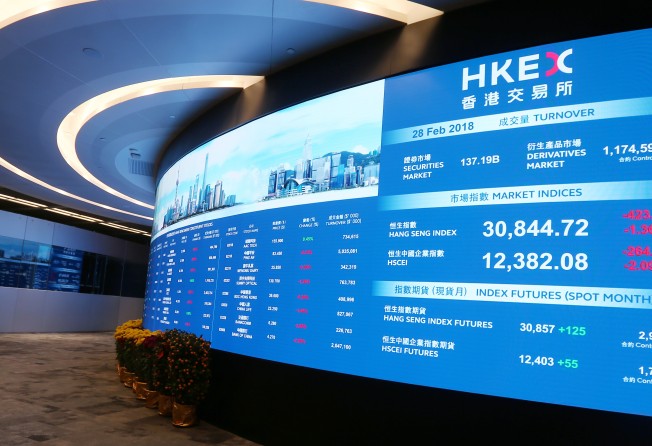Hong Kong investors seek shelter in consumer stocks amid trade war fears
Benchmark Hang Seng Index reverses early losses to end up 0.3pc, with Hengan International and China Mengniu Dairy rising sharply

Hong Kong stocks reversed early losses to end higher on Tuesday, fuelled by sharp gains in domestic consumption-related stocks as investors sought shelter in more defensive sectors amid fears about an escalating trade war between the US and China.
The Hang Seng Index dropped as much as 1.1 per cent in morning trade, after the US stocks tanked on Monday night. But it reversed its losses in the final hour of trading, ending up 0.3 per cent, or 86.72 points, at 30,180.10.
The Hang Seng China Enterprises Index, known as the H-shares index, gained 1.2 per cent, or 138.33 points, to 12,136.67.
Turnover on the main board dropped 15 per cent to HK$116.6 billion (US$14.85 billion) from the previous session.
Consumer stocks attracted the biggest buying interest. Hengan International, China’s largest producer of sanitary towels and diapers, soared 8.3 per cent to HK$78.7, the top gainer among Hang Seng Index constituent stocks.
China Mengniu Dairy Company, also an index component and one of the country’s largest milk producers, jumped 3.7 per cent to HK$27.9.
Analysts think trade tensions between the US and China are rising. Consumption-related stocks are one of the top investment themes at times of uncertainty.
“At such times, identifying companies with solid fundamentals is key,” said Kai Kong Chay, senior portfolio manager, Greater China Equities, at Manulife Asset Management.
He said he also favours investment themes that are domestically driven, such as private health care-related companies with recent progress on health care reform, and companies that can benefit from opportunities in environmental protection.
China announced on Monday that it had implemented tariffs of up to 25 per cent on 128 individual US imports, including pork, fruit, and wine, in retaliation for US President Donald Trump’s signing off on tariffs against steel and aluminium imports, particularly.
Chinese banks also advanced. Bank of Communications rose 2.1 per cent to HK$6.28, ICBC gained 1.3 per cent to HK$6.82, and Bank of China added 0.9 per cent to HK$4.26.
However, Power Assets Holdings shed 3.1 per cent to HK$62.00 after the stock had its recommendation downgraded to “neutral” from “buy” by Mizuho Securities.
BOC Hong Kong Holdings retreated 2.6 per cent to HK$37.20 after reporting full-year earnings of HK$31.1 billion yuan (US$3.96 billion) for 2017.
In the mainland, the Shanghai Composite Index ended down 0.8 per cent, or 26.55 points, at 3,136.63. The large-cap CSI300 dropped 0.6 per cent, or 24.44 points, to 3,862.48.
The start-up board index ChiNext and the Shenzhen Composite Index declined 1.5 per cent and 0.8 per cent to 1,872.47 and 1,842.23, respectively.
Technology stocks followed the turmoil among their US counterparts on Monday. Beijing Kunlun Tech tumbled 4.7 per cent to 24.79 yuan and G-bits Network Technology lost 4.1 per cent to 161.99 yuan. Yonyou Network Technology slid 5.3 per cent to 35.73 yuan.
But agricultural companies defied the sell-off after China re-imposed tariffs on US-imported farmed products ranging from pork to fruit as a retaliatory measure. Pig farmer Muyuan Foodstuff jumped 4.3 per cent to 49.25 yuan and Shandong Xiantan, a chicken processor, climbed 6.6 per cent to 23.41 yuan.
In the US, the S&P 500 Index finished below its average price for the past 200 days for the first time since June 2016, slumping 2.2 per cent overnight.
Technology stocks, the biggest contributors to the US bull run-up, bore the brunt of the sell-off after Trump unleashed a barrage of tweets accusing Amazon of not paying enough in taxes and underpaying the US Postal Service.